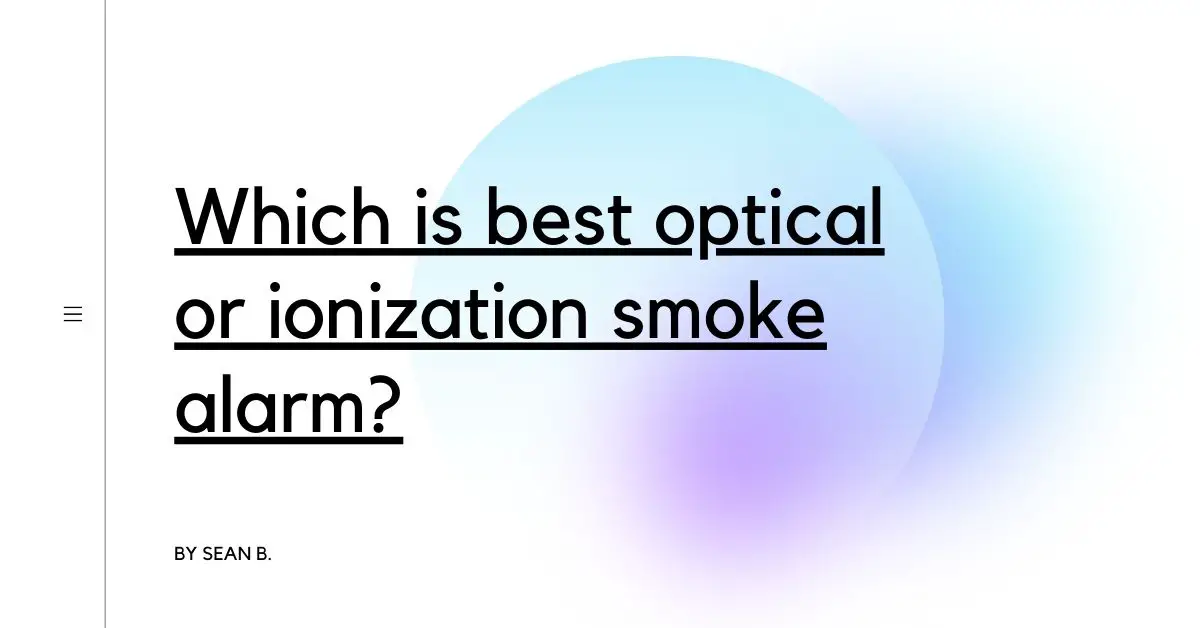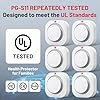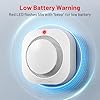When it comes to choosing a smoke alarm for your home, you may be wondering if an optical or ionization smoke alarm is best. In this blog post, we will take a look at the pros and cons of each type of smoke alarm to help you decide which is best for your needs.
Contents
The pros and cons of optical smoke alarms
When it comes to choosing a smoke alarm, there are two main types to choose from: optical or ionisation. Both have their pros and cons, so it’s important to understand the difference between them before making a decision.
Optical smoke alarms are generally more expensive than ionisation smoke alarms, but they are also more effective at detecting slow-burning, smouldering fires. This is because they use a light sensor to detect smoke particles, rather than relying on a radioactive element to detect them.
Ionisation smoke alarms, on the other hand, are less expensive but not as effective at detecting slow-burning fires. This is because they rely on a radioactive element to detect smoke particles, which means that they are more likely to produce false alarms.
So, which is the best type of smoke alarm to choose? It really depends on your individual needs and preferences. If you are worried about missing a slow-burning fire, then an optical smoke alarm is the best choice. However, if you are on a budget or if you are worried about false alarms, then an ionisation smoke alarm may be a better option.
The pros and cons of ionisation smoke alarms
There are pros and cons to both optical and ionisation smoke alarms. Optical alarms are better at detecting smoldering fires, while ionisation alarms are better at detecting flaming fires. However, both types of alarms have their drawbacks. Optical alarms can be triggered by dust or insects, while ionisation alarms can be triggered by cooking smoke or steam. Ultimately, it is up to the homeowner to decide which type of alarm is best for their home.
The difference between optical and ionization smoke alarms
When it comes to choosing a smoke alarm, you may be wondering whether an optical or ionisation smoke alarm is best. Both types of smoke alarms have their own advantages and disadvantages, so it’s important to understand the difference between them before making a decision.
Optical smoke alarms work by detecting visible particles of smoke. They are less likely to be triggered by cooking fumes or steam, making them ideal for kitchens or bathrooms. However, optical smoke alarms can be more expensive than ionisation smoke alarms.
Ionization smoke alarms work by detecting ions in the air. They are more sensitive than optical smoke alarms and can therefore detect smoke more quickly. However, they are more likely to be triggered by cooking fumes or steam, which can cause false alarms.
How to choose the right type of smoke alarm for your home?
When deciding which type of smoke alarm to choose for your home, it is important to consider the benefits and drawbacks of each type. Optical smoke alarms, also known as photoelectric smoke alarms, are best at detecting slow-burning fires.
These fires typically smolder for hours before igniting, and produce large amounts of smoke. Ionization smoke alarms, on the other hand, are better at detecting fast-burning fires. These fires typically ignite quickly and produce less smoke.
So, which type of smoke alarm is best for your home? If you are worried about slow-burning fires, an optical smoke alarm is a good choice. However, if you are worried about fast-burning fires, an ionization smoke alarm is a better option.
Why optical smoke alarms are gaining popularity?
Smoke alarms play a vital role in fire safety, and there are two main types of smoke alarms on the market: optical and ionisation. Both have their pros and cons, but optical smoke alarms are gaining popularity for a number of reasons.
One of the main advantages of optical smoke alarms is that they are less likely to cause false alarms. This is because they use a light sensor to detect smoke, rather than a radioactive element like ionisation smoke alarms. This means that they are not as sensitive to cooking fumes and other airborne particles, which can trigger false alarms.
Another advantage of optical smoke alarms is that they are more effective at detecting slow-burning fires. This is because the light sensor is more sensitive to smoldering fires, which often go undetected by ionisation smoke alarms.
Finally, optical smoke alarms tend to be more reliable in general. This is because they have fewer moving parts and are less likely to break down.
So, which type of smoke alarm is best for you? If you’re looking for a reliable and effective smoke alarm, then optical is the way to go.
Why ionization smoke alarms are still the best choice for some homes?
There are a few reasons why ionisation smoke alarms are still the best choice for some homes. First, they are more sensitive to smaller particles, which means they are better at detecting fires that are just starting. Second, they are less likely to have false alarms because they don’t react to things like dust or steam. Third, they are less expensive than optical smoke alarms.
So, if you are looking for a smoke alarm that is more sensitive and less likely to have false alarms, then an ionisation smoke alarm is the best choice for you.
How to make sure your smoke alarm is working properly?
If you’re wondering which type of smoke alarm is best for your home, it’s important to understand the difference between optical and ionisation smoke alarms. Optical smoke alarms, also known as photoelectric smoke alarms, are more sensitive to slow-smouldering fires, while ionisation smoke alarms are more responsive to fast-flaming fires.
So, which type of smoke alarm should you choose? It depends on the type of home you have and the type of fire risk you’re facing. If you live in a house with a lot of electrical equipment, for example, you may be at greater risk of a fast-flaming fire. In this case, an ionisation smoke alarm would be the best choice.
If you’re not sure which type of smoke alarm is best for your home, it’s a good idea to talk to a fire safety expert. They can help you assess your fire risk and recommend the best type of smoke alarm for your needs.
Summary
There are pros and cons to both optical and ionisation smoke alarms, so it really depends on your specific needs as to which one is best for you. Optical alarms are less likely to be set off by cooking smoke or steam, but they are more expensive. Ionisation alarms are more sensitive and less expensive, but they are more likely to be set off by cooking smoke or steam.



















